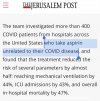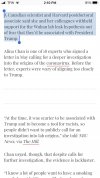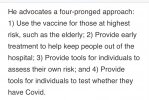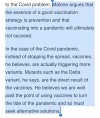You are using an out of date browser. It may not display this or other websites correctly.
You should upgrade or use an alternative browser.
You should upgrade or use an alternative browser.
C19 Topics
- Thread starter muttly
- Start date
RLENT
Veteran Expediter
Curious what most all doctors think about this:
I'd assume that they are not all that concerned ... since it seems to be pretty rare:
Sweden halts use of Moderna's COVID vaccine in under 30s
Looks promising…

 www.jpost.com
www.jpost.com
Aspirin lowers risk of COVID: New findings support preliminary Israeli trial
The treatment reduced the risk of reaching mechanical ventilation by 44%. ICU admissions were lower by 43%, and an overall in-hospital mortality saw a 47% decrease.
Attachments
Wouldn't that be something! We've had the answer all along. A Bayer and a cup of coffee, perhaps?Looks promising…

Aspirin lowers risk of COVID: New findings support preliminary Israeli trial
The treatment reduced the risk of reaching mechanical ventilation by 44%. ICU admissions were lower by 43%, and an overall in-hospital mortality saw a 47% decrease.www.jpost.com
Yes, it would be something if we had the answer all along. But as with most things COVID, it's not that simple.Wouldn't that be something! We've had the answer all along. A Bayer and a cup of coffee, perhaps?
It looks like your trial examined people already infected with the virus in the hospital.Yes, it would be something if we had the answer all along. But as with most things COVID, it's not that simple.
My study examined aspirin use as a preventative pre blood clot, pre virus infection regimen to see if there was a reduction of mortality rates.
These people were already taking daily aspirin for treatment or as a preventative for something else unrelated to the virus.

Your study, my study .... this is not a contest.It looks like your trial examined people already infected with the virus in the hospital.
My study examined aspirin use as a preventative pre blood clot, pre virus infection regimen to see if there was a reduction of mortality rates.
These people were already taking daily aspirin for treatment or as a preventative for something else unrelated to the virus.
View attachment 20875
Can't you simply wait for the time required for comprehensive research to be done, for the multiple studies to be peer-reviewed, and for a consensus of experts to develop for the truth to then be known?
I only posted the link I did to illustrate that one study here and another there will not provide the answers. Research takes time. The pandemic is new. Except for ignorant people eager to make a point and willing to close their eyes to information that may compel them to change their minds, no single study is going to be persuasive, nor should it be.
Also, I think it is foolhardy for amateurs like you and me to get into a dueling study debate. Really, I can't think of a better way for two non-professionals to work together to convince the world they are stupid.
One of my nieces has a PhD in microbiology. She began her career as a college student, earning her bachelor’s degree in microbiology. That included courses in microbial genetics, microbial physiology, environmental microbiology, and virology. She also took classes in other sciences, including biochemistry, chemistry, physics, statistics, mathematics, and computer science. She also gained laboratory experience before entering the workforce. All of this prepared her to do complex data analysis.
She then studied four more years to earn her PhD., and she is now doing postdoctoral work with experienced scientists as she continues to learn and develop a broader understanding of research.
She and I do not speak often, but when I ask her about a study or something about COVID-19, she does not give oversimplified answers like you do. Nor does she cite a single study as proof of anything.
Frankly, muttly, you and I are not qualified to interpret a COVID-related study of any kind. My niece is. Other experts are. But we are not.
If you look at my comments about studies, I think you will see I respect that fact. Take natural immunity for example. Is it real? How long does it last? How is it different from vaccinated immunity? There are a number of studies about it already out there and more coming.
Based on the studies I've seen so far, I'm willing to say there may be something to natural immunity. But I'm not so foolish or arrogant to state a "truth" about natural immunity and cite a single study as proof-positive that my truth is the real truth.
Last edited:
Interesting. So far, the only other news organizations reporting this cite the Epoch Times as the source. It would be a big story if true. Waiting to see if this is confirmed by others.Anyone seen this?
Epoch TimesZeroHedge
ZeroHedge - On a long enough timeline, the survival rate for everyone drops to zerowww.zerohedge.com
No, you posted another article as a counter to mine and stated it’s not that simple meaning the link you provided was refuting my link’s study. It did nothing of the sort for the reasons I already gave. And I merely stated after linking it that “ it looks promising…” i do not close my eyes to information about this virus that may change my mind. I was pro vaccine when they first came out. Still am, but I keep an open mind about potential dangerous issues that have been reported. So I’m not Gaga about this vaccine as the only answer. I also didn’t dismiss the study you linked out of hand. It may very well be the case that aspirin doesn’t affect mortality rates given to patients already in the hospital. That study, while not definitive, is noted by me.Your study, my study .... this is not a contest.
Can't you simply wait for the time required for comprehensive research to be done, for the multiple studies to be peer-reviewed, and for a consensus of experts to develop for the truth to then be known?
I only posted the link I did to illustrate that one study here and another there will not provide the answers. Research takes time. The pandemic is new. Except for ignorant people eager to make a point and willing to close their eyes to information that may compel them to change their minds, no single study is going to be persuasive, nor should it be.
Also, I think it is foolhardy for amateurs like you and me to get into a dueling study debate. Really, I can't think of a better way for two non-professionals to work together to convince the world they are stupid.
One of my nieces has a PhD in microbiology. She began her career as a college student, earning her bachelor’s degree in microbiology. That included courses in microbial genetics, microbial physiology, environmental microbiology, and virology. She also took classes in other sciences, including biochemistry, chemistry, physics, statistics, mathematics, and computer science. She also gained laboratory experience before entering the workforce. All of this prepared her to do complex data analysis.
She then studied four more years to earn her PhD., and she is now doing postdoctoral work with experienced scientists as she continues to learn and develop a broader understanding of research.
She and I do not speak often, but when I ask her about a study or something about COVID-19, she does not give oversimplified answers like you do. Nor does she cite a single study as proof of anything.
Frankly, muttly, you and I are not qualified to interpret a COVID-related study of any kind. My niece is. Other experts are. But we are not.
If you look at my comments about studies, I think you will see I respect that fact. Take natural immunity for example. Is it real? How long does it last? How is it different from vaccinated immunity? There are a number of studies about it already out there and more coming.
Based on the studies I've seen so far, I'm willing to say there may be something to natural immunity. But I'm not so foolish or arrogant to state a "truth" about natural immunity and cite a single study as proof-positive that my truth is the real truth.
I’d give pause in throwing around the expert title to people. They may have credentials and degrees, letters after their names. If anything this virus has proved is how little they know and how many times the “experts” have been wrong. See Fauci’s history of comments about just about everything Covid or mask related. Or “experts” who said and still say hydroxychlorquine or Ivermectin have no efficacy towards the vaccine and are unsafe when given recommended dosages. Or the “experts” who said that the vaccines would take 3 years instead of less than one year to get here. Or the “experts” that said after getting the vaccine that you it’s highly unlikely to get the virus and that you can’t spread it. “Experts” have been proven wrong again and again.
So let’s keep an open mind about what works and what may work as well because sometimes those “experts” may have a political agenda or are compromised by competing interests against other medicines other than the vaccines that will help people overcome the virus.
Just like champion baseball players like Babe Ruth misses more than he hits, experts are wrong more than they are right. Science is not advanced by knowing the truth in advance. It is advanced by experimentation which shows what does not work more often than it shows what does.I’d give pause in throwing around the expert title to people. They may have credentials and degrees, letters after their names. If anything this virus has proved is how little they know and how many times the “experts” have been wrong.
It frustrates me to see people unfairly dismiss the experts as wrong or biased because something they said earlier turned out to be wrong today. Holding them to the expectation of perfection and then condemning them when they fail to meet it is unfair and unhelpful in advancing the public debate.
Yes, it often happens that experts disagree. But that does not make them less qualified to do the work they do, and it does not make their conclusions and advice worth less (or worthless).
I hold them to the standard of not being politically influenced or out of fear of retribution not publicly supporting a particular position after following the science. We would be naive that this is the only example from “experts” and people with letters after their names. #Ivermectin #HydroxychlorquineJust like champion baseball players like Babe Ruth misses more than he hits, experts are wrong more than they are right. Science is not advanced by knowing the truth in advance. It is advanced by experimentation which shows what does not work more often than it shows what does.
It frustrates me to see people unfairly dismiss the experts as wrong or biased because something they said earlier turned out to be wrong today. Holding them to the expectation of perfection and then condemning them when they fail to meet it is unfair and unhelpful in advancing the public debate.
Yes, it often happens that experts disagree. But that does not make them less qualified to do the work they do, and it does not make their conclusions and advice worth less (or worthless).

So the only experts you'd support are those who share and have the courage to espouse your political view?I hold them to the standard of not being politically influenced or out of fear of retribution not publicly supporting a particular position after following the science. We would be naive that this is the only example from “experts” and people with letters after their names. #Ivermectin #Hydroxychlorquine
You talk of following the science. Where the scientists do not agree, whose science do you follow? Also, when you say "follow the science", what does that mean exactly? What is it exactly that you would have us follow?
It seems like almost everyone is crying "follow the science" no matter how spot-on or off-beat one's view may be. That phrase has become a meaningless term. It's like saying we have to do X because "This is America!"
Last edited:
Very simple: Keep politics out of science. If I see an “expert” be political than I lose confidence in what they are saying.So the only experts you'd support are those who share and have the courage to espouse your political view?
You talk of following the science. Where the scientists do not agree, whose science do you follow? Also, when you say "follow the science", what does that mean exactly? What is it exactly that you would have us follow?
It seems like almost everyone is crying "follow the science" no matter how spot-on or off-beat one's view may be. That phrase has become a meaningless term. It's like saying we have to do X because "This is America!"
Is there such a person on earth or in the history of science?Very simple: Keep politics out of science. If I see an “expert” be political than I lose confidence in what they are saying.
A link to an article that introduces the scientific method is below. Notice that the advancement of science or scientific knowledge begins with a question and scientists are human beings. Therefore human beings begin the process.
I cannot think of a single scientific question that is not political, such that when you choose to research an answer to one question, you are automatically choosing to not answer and not dedicate resources (time, money, mental focus) others questions.
Do you want to know if changing school start times to a later hour improves student performance? That's an interesting question. Do you want to know if COVID-19 natural immunity is as robust as vaccinated immunity? That too is an interesting question. But resource constraints mean you cannot answer both so you must decide which to pursue ... and that is a political choice, having nothing to do with science. Once the choice is made, the scientific method can be applied, but not before. Politics defines the questions. Science answers them.
If you have reason to believe ivermectin prevents COVID-19 infections, you research that by asking, does ivermectin prevent COVID-19 infections? Following the scientific method, you form your hypothesis (ivermectin prevents COVID-19 infections) and follow the scientific method to prove or disprove it ... giving equal weight to the both the possibility your hypothesis is true, and the possibility your hypotehis is false.
If you have reason to believe ivermectin cures people of COVID-19 after they are infected, that's a different hypothesis that would require the same scientific method to explore but a different research path to follow.
And if you have reason to believe ivermectin is ineffective as a COVID-19 prophylactic or cure, the same method would apply and yet another research path would follow.
But behind all of these questions is the very human decision to ask a particular question in the first place. It all begins with a bias or an assumption or at least an area of interest that is deemed more important than everything else a scientist might focus one's attention on.
What if you really, really, really think; and really, really, really want to believe, and really, really, really want it to be true that ivermectin cures COVID-19? Can you as a researcher use the scientific method to prove your point? Yes you can, as long as your methods are sound and you are equally open to "follow the science" if your research results show your hypothesis is false. You are not required to not have a bias in formulating your hypothesis. But to reach conclusions that will be accepted by the scientific community, you are required to suspend your bias and follow the scientific method in an objective manner.
The scientific method addresses the bias question not at the beginning of the process where the decision is made about what question to ask or what topic to research, but at the end when the research that was done is subject to peer review. Before your research and conclusions are considered valid, they must be deemed by others also trained in the scientific method to have been properly done and logicly derived.
In that regard, more harm than good has been done by social media, over-eager journalists, lay people laden with confirmation bias and pre-print web sites where research is published before peer review have done more harm than good.
Above, you highlighted the following statement: "A Canadian scientist and Harvard postdoctoral associate said she and her colleagues withheld support for the Wuhan lab leak hypothesis out of fear that they'd be associated with President Trump." And you said, "I hold them to the standard of not being politically influenced or out of fear of retribution not publicly supporting a particular position after following the science."
In this case, what science is there to follow? It seems to me the Wuhan lab leak question is not a question for scientists. It's a question for detectives and criminologists. You're not going to answer that question in a laboratory or research institute following the scientific method. You're going to answer this question in a safety department following that department's procedures, or in the courts following the law and the rules of evidence.
The Canadian scientist and Harvard associate may very well have demonstrated political bias or responded to political fears in this case, but they were not doing research. You can fault them for their political choices but you cannot fault them for not following the science.
This is a long-winded way of elaborating on the point I made above. "Follow the science" has become a mantra used by so many that the phrase itself has become almost meaningless; except in labs where trained researchers have done and continue to do it every day.
I fully understand your desire to dismiss an expert because he or she does had bad motives (a logical falacy by they way). But just because the passage you cite incorrectly used the word "hypothesis," it does not mean these experts failed to follow the science. In this case, saying they did not follow the science is like saying they failed to drive on the right side of the road, when in fact they were traveling by plane.
The Scientific Method | Boundless Psychology
One last thing about "follow the science."
There is a huge volume of good, peer-reviewed research showing the consumption of alcohol is bad for you. It adds excess calories. It interferes with good quality sleep. In larger quantities it places you in a less effective mental state. In larger quantities, it reduces your ability to safely drive or operate machinery, etc. In certain people, it triggers a horrible condition named alcoholism. "Over time, excessive alcohol use can lead to the development of chronic diseases and other serious problems including: High blood pressure, heart disease, stroke, liver disease, and digestive problems. Cancer of the breast, mouth, throat, esophagus, voice box, liver, colon, and rectum." (Source: CDC).
How many people preach "follow the science" and then drink that very day?
Last edited:
One last thing about "follow the science."
There is a huge volume of good, peer-reviewed research showing the consumption of alcohol is bad for you. It adds excess calories. It interferes with good quality sleep. In larger quantities it places you in a less effective mental state. In larger quantities, it reduces your ability to safely drive or operate machinery, etc. In certain people, it triggers a horrible condition named alcoholism. "Over time, excessive alcohol use can lead to the development of chronic diseases and other serious problems including: High blood pressure, heart disease, stroke, liver disease, and digestive problems. Cancer of the breast, mouth, throat, esophagus, voice box, liver, colon, and rectum." (Source: CDC).
How many people preach "follow the science" and then drink that very day?
Not quite agreeing with your police work Lou. You’re talking about excessive use of alcohol would cause those conditions. Many doctors also say that light to moderate alcohol consumption may have a positive effective on cholesterol and heart health as well as other conditions such as Alzheimer’s. Studies back that up, So yes, apparently they would be following the science if they consumed alcohol, within limits of course.
Detectives and criminologists usually rely on forensics examined by forensic scientists and/or medical examiners that give their conclusions to assist in an investigation. That valuable information helps a detective solve a crime. They don’t blindly go detectiving. The Canadien scientist or Harvard associate didn’t have to work in the actual Wuhan lab examining bats to be able to utilize their knowledge in viruses and how this particular virus may have originated and at least come forward publicly and say yes, this is at least plausible and recommend investigators (“detectives”)examine the lab. Instead they chose to be afraid of the repercussions with agreeing with Trump and made a political decision to keep quiet.Above, you highlighted the following statement: "A Canadian scientist and Harvard postdoctoral associate said she and her colleagues withheld support for the Wuhan lab leak hypothesis out of fear that they'd be associated with President Trump." And you said, "I hold them to the standard of not being politically influenced or out of fear of retribution not publicly supporting a particular position after following the science."
In this case, what science is there to follow? It seems to me the Wuhan lab leak question is not a question for scientists. It's a question for detectives and criminologists. You're not going to answer that question in a laboratory or research institute following the scientific method. You're going to answer this question in a safety department following that department's procedures, or in the courts following the law and the rules of evidence.
The Canadian scientist and Harvard associate may very well have demonstrated political bias or responded to political fears in this case, but they were not doing research. You can fault them for their political choices but you cannot fault them for not following the science.
This is a long-winded way of elaborating on the point I made above. "Follow the science" has become a mantra used by so many that the phrase itself has become almost meaningless; except in labs where trained researchers have done and continue to do it every day.
I fully understand your desire to dismiss an expert because he or she does had bad motives (a logical falacy by they way). But just because the passage you cite incorrectly used the word "hypothesis," it does not mean these experts failed to follow the science. In this case, saying they did not follow the science is like saying they failed to drive on the right side of the road, when in fact they were traveling by plane.
Last edited:




